WATCH: Why Lesotho zama zamas risk lives to find gold in SA's abandoned mines
In the wake of a methane gas explosion that claimed the lives of 31 people at a decommissioned mining shaft near Welkom in South Africa, a zama zama from Lesotho explains the desperation that drove him to look for gold underground.

Shaft five at the Harmony Gold mine in Virginia, Welkom. Picture: Supplied
JOHANNESBURG - Armed, dangerous, organised, and relentless in their pursuit of gold.
Zama zamas (a colloquial term for illegal miners) from neighbouring countries continue to wage war on South African soil, holding mining companies to ransom in their quest for a better life.
But it’s a life that comes with huge risks.
On 18 May, at least 31 Lesotho nationals died during a methane gas explosion at a decommissioned mining shaft in Virginia, near Welkom.
WATCH: Survivor recalls Virginia zama zama tragedy
Two zama zamas survived the explosion and managed to - with the assistance of other zama zamas - recover the bodies of three victims.
At least 28 bodies remain trapped beneath the surface.
The men had been underground for at least two months prior to the explosion, which occurred in shaft five at Harmony Gold mine.
A previous methane gas explosion in the mid-1980s forced the mine to close the shaft permanently due to risks associated with mining there.
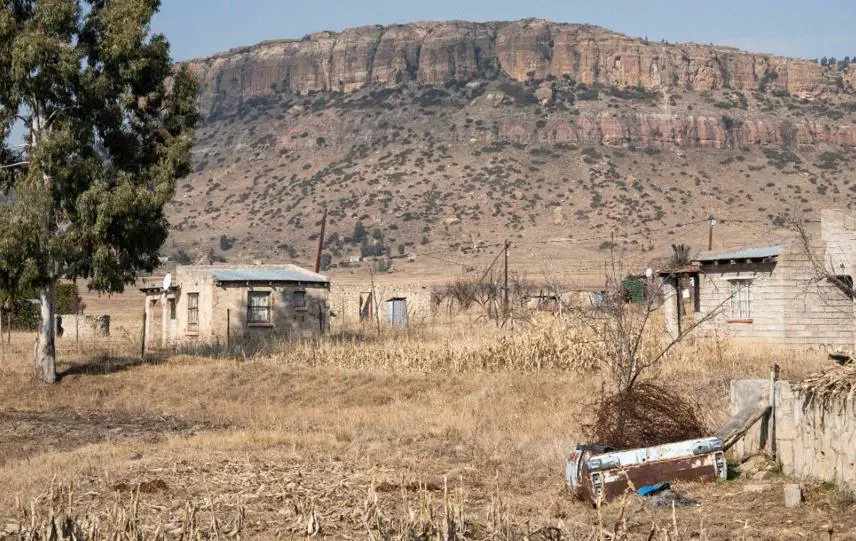
A village in rural Lesotho. Picture: Jacques Nelles/Eyewitness News
THE SURVIVOR
Eyewitness News tracked down one of the survivors, whose three brothers were killed in the explosion, and spoke to him on condition of anonymity.
His long black trench coat conceals his jacket with the Lesotho national flag on it.
Avoiding eye contact, he hides his hands in his lap, fearing someone might recognise his scars, much like the ones strewn across his face.
He dwells on each question as if his thoughts are racing away from him before he delivers brief answers.
He alleges that the explosion was not caused by methane gas but rather security personnel from Harmony Gold mine who dropped bombs into the shaft.
"There were vehicles belonging to the mine bosses. As soon as they left, there was smoke and an explosion. The people who were nearer called and told us they think the boss poured something in the mine. They then took pictures of the cars. We heard what happened from the people who live closer to the mine."
He says the bodies they recovered were "rotten".
"After those men were burned, they no longer had skin, we couldn't even take their smell, it was so bad, but we had to try. They were in very bad shape. I'm not OK. I can't do anything. Their families and parents keep calling me. All they want are their remains. I also want their remains, they are my brothers. I know they are dead."
He describes life in the mine.
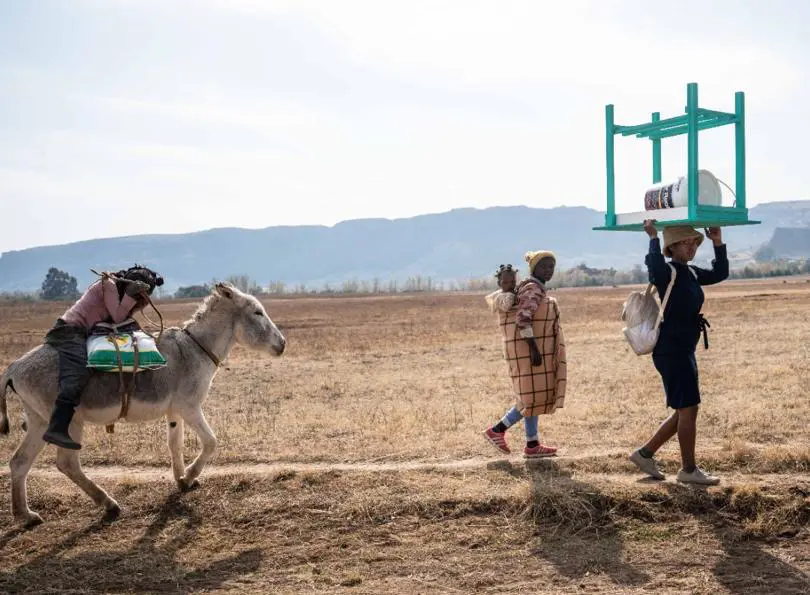
A family moves their goods around in rural Lesotho. Picture: Jacques Nelles/Eyewitness News
"Life down there is tough, it's not like up here. Firstly, it's very hot, you cannot walk around dressed like me. You would be without a shirt or with a vest and shorts, then you would look for gold. When you arrive, you don't just find it, you have to look. That may take time. When you come back up, there is a difference, it's cold up here, not like in the mine."
He says how long they stay underground is dependent on the amount of food they have.
Instant porridge, tinned food and biltong is what they survive on, with water usually being located underground.
He claims he has been working as a zama zama for two years, moving from one mine shaft to the next.
"I was told there is work, that's how I ended up in the mine. It doesn't sit right with me because I have been looking for work in Lesotho with no success. I ended up going down there because I needed a job. What I need is money. All I want is a job."
In a video supplied to Eyewitness News, three bakkies are seen driving away from the mine shaft where the explosion occurred on 18 May.
The man filming claims: "Here are the white man’s cars as you can see they are coming from Mpobong. This is the envoy from Mpobong and I suspect that they left (or planted) another bomb in Mpobong. They are leaving but as you can see for yourself, here are the cars."
Harmony Gold mine spokesperson, Moeketsi Manoeli, denounced allegations that mine personnel had played a hand in the explosion.
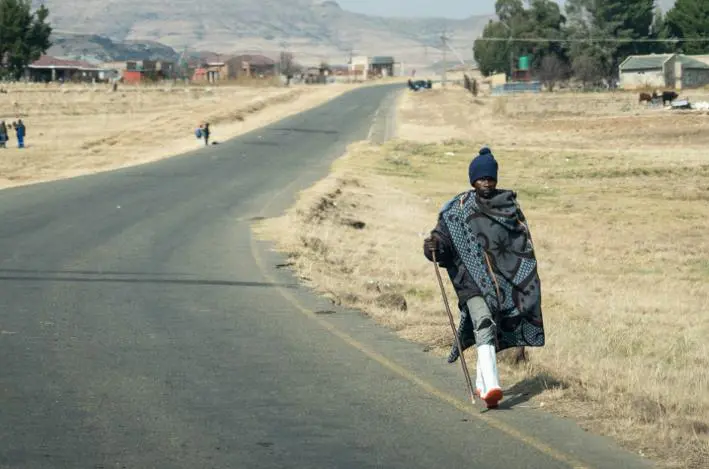
A man walks to his destination in rural Lesotho. Picture: Jacques Nelles/Eyewitness News
"We did see the video and it doesn’t really prove anything. I want to reiterate that there were four explosions prior to this tragic one and the most recent one that happened in 2021, where the explosion was ignited by a plug that switched on underground. Any mining company has lots of security that patrols and monitors on sites. We preach responsible stewardship as one of our strategic pillars. For us to act in such an unethical manner is unheard of so we think it’s very irresponsible for people to make such allegations against us."
Manoeli said that according to their readings, there was just over 1% of methane still present in the mine shaft, preventing anyone from entering.
"There has to be no methane present at all. So even if there’s a little bit of methane, it is not going to be suitable for anyone to go down there, so there should be zero percent of methane at any given point."
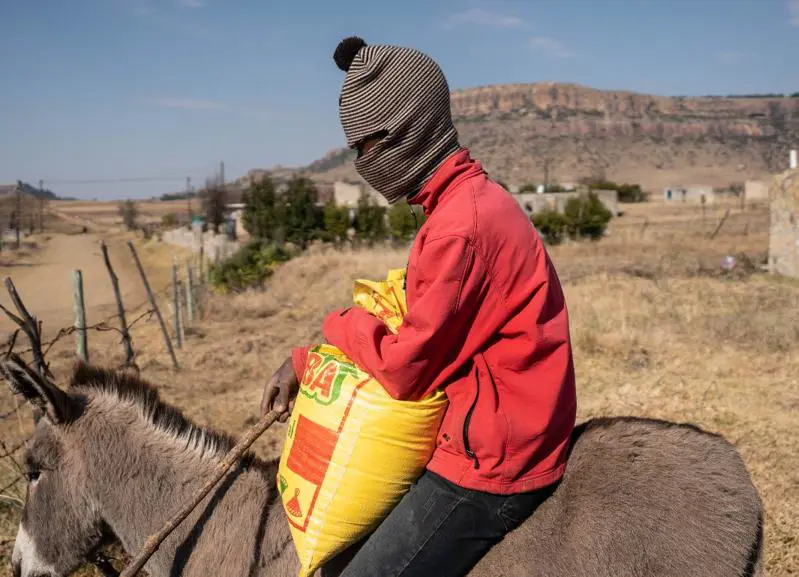
A donkey is the most common method of transport in the rural parts of Lesotho. Picture: Jacques Nelles/Eyewitness News
THE SYSTEM AND HIERARCHY
Through sources with intimate knowledge of how the hierarchy and system of illegal mining works, Eyewitness News has been able to establish the following:
- The majority of the foot soldiers are of Lesotho, Zimbabwean and Mozambican nationality.
- Depending on the grade and quality of gold they uncover, a footsoldier can earn anything upwards of between R1,000 and R5,000 a day.
- People of Shona origin are usually the buyers of the gold from the footsoldiers.
A zama zama explains: "They are Shona buyers (from Zimbabwe or Mozambique) - they either work in mines or with the gold from the mine."
The Shona buyers are the first point of purchase for the middlemen, who are involved with the higher-end buyers, usually based in Johannesburg but having links across the country.
"Majority of the gold is bought by these people in Johannesburg, who then sell it in bulk to buyers in Dubai using the Hawala system," one source said.
Hawala is considered a form of underground banking by transmitting money without any currency actually moving. It is frequently used by money launderers and terrorists to transfer funds globally.
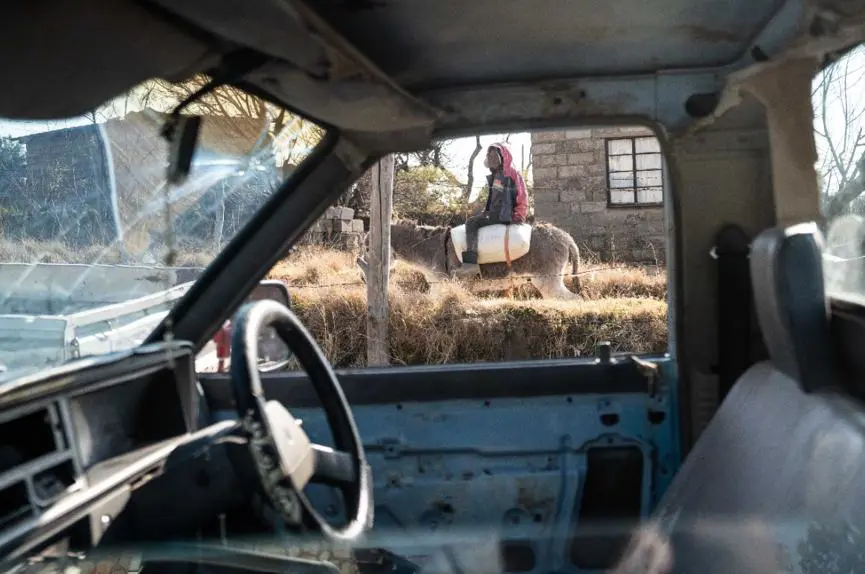
A boy rides a donkey in a rural part of Lesotho. Picture: Jacques Nelles/ Eyewitness News
A MOUNTAIN OF POVERTY
The incident at Harmony Gold mine has cast aspersions on Basotho men, who continue to flock to SA in large numbers to work as zama zamas.
Eyewitness News ventured into the landlocked country and spoke to the Lesotho government, as well as some of the families of the victims.
High levels of poverty and unemployment is seen as the driving force behind Lesotho men taking up jobs as zama zamas.
Moeti Ramaema, 60, said that one of his grandsons was killed in the explosion.
"We cannot control a person who is an adult. When they leave here (Lesotho), they don’t tell us they are going to become zama zamas. They only say they are going to look for jobs. We don’t even know they are working there."
He said young Basotho men were influenced by other zama zamas.
"The problem is that if one zama zama goes and when he comes back they see him building a house and doing all these things. That’s the thing that attracts the others. They inquire from that person and he shows them how to work and become a zama zama."
Ramaema says in order for the crackdown on zama zamas to work, South African police would need to arrest the buyers of this illegal gold.
"The zama zamas collect things from underneath, they don’t sell it. It’s sold by the South African people. They know, even the government, they know. This thing is just a hidden agenda. It’s just that Mr Mantashe is trying to put the blame on those people - he knows exactly."
Meanwhile, the family of 36-year-old Tshepo Monethi are anxiously waiting for his body to be repatriated back to Lesotho.
Monethi’s body is one of three which was recovered by zama zamas.
Monethi’s grandfather, Leboto, said that his body was in a bad way as he was fatally burnt during the explosion.
"It’s very horrible. I’m made to understand it’s just a skull. I don’t think it’s a body one can look at and still feel at ease."
He said many of the young men in Lesotho had been forced to find quick means of cash to take care of their families.
"The main reason why these kids are going over there is because of unemployment. They’ve got kids to support, they’ve got wives but due to lack of jobs within the country, they are forced to go out."
He said Lesotho had rich natural resources but the issue of unemployment boiled down to the processing of these natural resources in their country.
"We’ve got water, gold and diamonds. The resources are there but to make them operate in the country is difficult."
ECONOMIC SABOTAGE
Last week, Mineral Resources and Energy Minister Gwede Mantashe visited the site, emphasising that illegal mining was a criminal activity amounting to economic sabotage.
"There is a problem of a growing number of illegal miners. Many of them come heavily armed and therefore both [Lesotho and South African] governments must have cooperation in dealing with that crisis."
A report published by Global Initiative in 2019 estimates there are approximately 30,000 zama zamas in South Africa, which costs the country an estimated R14 billion a year in lost production.
Mantashe said mine management detected movement in the shaft, which could possibly mean there were survivors.
But the zama zamas who ventured down claimed this was not the case as everyone was dead.

Two people collect wood in Lesotho. Picture: Jacques Nelles/ Eyewitness News
Minister of foreign affairs in Lesotho, Lejone Mpotjoane, said he was aware that Basotho men are heavily involved in illegal mining activities in South Africa.
Speaking to Eyewitness News from his office in Maseru, Mpotjoane, said that the poor economic climate in their country was the main factor forcing Basotho men into illegal mining.
"We have seen the economy of Lesotho going down and as the economy goes down, there are no jobs. There are some gangs of Basotho, we acknowledge that, and those gangs are doing some acts of illegal activities in South Africa and as the government of Lesotho, we don’t condone that.
Mpotjoane said that while they were working closely with the South African government to resolve the issue of illegal mining, efforts needed to be concentrated on arresting the buyers.
"The issue of illegal mining, if you can just think about it, it looks like an industry, it looks like people who are buying this gold which is dug illegally and I can assure you, the buyers are not in Lesotho."
He said that they were working on job creation.
"It is in our priorities to build productivity in the areas of agriculture, energy generation as well as tourism, Such that we create enough jobs for Basotho to stay in Lesotho and to work in Lesotho."